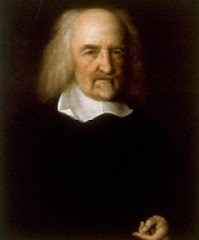Sunday, April 27, 2008
Could a system of divided and limited government count as a Hobbesian sovereign?
Certainly. Hobbes offers a functional definition of a sovereign as an authoritiative public judgment to resolve all disputes and enforce those decisions. Experience proves that a mixed and tempered system may serve that function. Even so, we should keep in mind that the American experiment had not lasted 100 years before it imploded into civil war. Was Hobbes right that these mixed systems are less stable?
Subscribe to:
Post Comments (Atom)

5 comments:
The advantage a single sovereign would have is that it leaves no one to disagree with - except about the critical matter of who the next sovereign will be. A mixed system allows for more immediate disagreement, but might be based on principle that reduce the problematic of transfer of power. The American experiment has proved remarkably stable in that regard.
Divided, sure. But would Hobbes really describe a government like the U.S. as "limited?" Each branch is limited, but the limitations are enforced only by other branches -- the only reason Congress is limited is because the Supreme Court enforces the Constitution, and the Court could choose to cease doing so... so I think Hobbes could say that the branches together have unlimited power.
Or do you mean something else by "limited?" ("Resolve all disputes" seems to exclude "limited" on the ordinary meaning.)
If there are ever to be any limits posed, they must be self-imposed. (What else?) [Gowder's sugggestive comment makes me wonder whether we can we coherently think of the present US government as a sovereign system in Hobbes's sense? If so, (as I think) that would go a long way toward debunking the myth that his philosophy entails absolutism. Maybe that's wrong, and his absolutism is grounded elsewhere.
I think Hobbes would not see this form of government as "limited" in the disfunctional way (the buck stops nowhere.)
Would it be weird to think of Hobbes as endorsing a CONSTITUTIONAL DEMOCRACY?
First, the Americans had no civil war. It was a war between two countries.
Second, the idea of each branch limiting each other has failed. Examine the government and those writing about in up until Tocqueville and compare it to what we have now. There has been unprecedented growth. There are several reasons for this (Lincoln, progressivism, collectivism, Great Depression, War on Terror etc.), but one that has been largely overlooked is that government will usually work with itself to grow. In essence, each branch does not limit the other branches, but instead assists the other in growth through the process of compromise. Occasionally they appear to limit each other, usually in fights between the legislative branch and the executive branch. However, in many they eventually formed a compromise that grew their powers.
My apologies to the blog owner for not addressing the immediate issues and I hope you don't mind me introducing new issues.
I like the suggestion that the U.S. could count as an absolutist government in Hobbes's sense. But if that's right, what present day countries would count as non-absolutist in Hobbes's sense?
It does indeed seem odd to understand Hobbes as endorsing a constitutional democracy. His critique of divided/limited government seems to lose much of it's force. But maybe that's a good thing.
Post a Comment